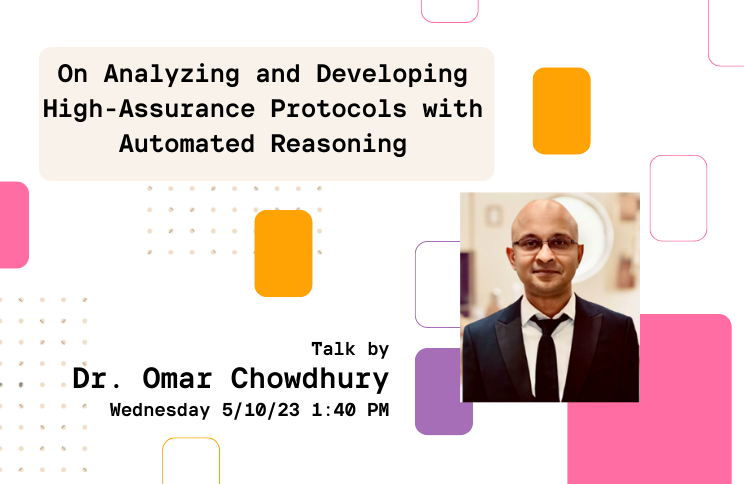
Date and Time: 5/10/23 1:40 PM
Register Here!
Abstract
In modern cyberspace, computer systems and software often rely on different protocols for achieving critical functionality and guarantees, including security, privacy, safety, and quality-of-service of communication. In practice, however, deployed protocols such as TCP, SSL/TLS, SSH, OAuth, and 4G/5G have often failed to attain the necessary assurances due to design flaws, complexity, implementation bugs, or improper threat models. As protocols often operate on the edge of the system’s trust boundary, a protocol’s noncompliance with its design can be exploited by an adversary to break the system’s overall guarantees. In this talk, I will briefly cover my group’s research on applying automated reasoning and formal verification techniques that can enable one to design and develop high-assurance protocols that can withstand adversarial influence in practice.
Bio
Dr. Omar Haider Chowdhury is a SUNY Empire Innovation Scholar and an Associate Professor of Computer Science at Stony Brook University (SBU). Before joining SBU, he was an Associate Professor of Computer Science at the University of Iowa where he was awarded the Dean’s Scholar Award. Before his faculty appointment at Iowa, he worked as Post-doctoral researchers at both Carnegie Mellon University and Purdue University.
Dr. Chowdhury got his Ph.D. in Computer Science from UTSA and his B.Sc. in Computer Science and Engineering from the Bangladesh University of Engineering and Technology. His research interest broadly lies in Computer Security and Privacy. Particularly, his research group has been focusing on applying principled techniques from formal verification, automated reasoning, programming languages, software engineering, and computational logic to solve practically-relevant security and privacy problems in emerging safety-critical systems, software, and protocols. His work has identified and proposed defenses for fundamental vulnerabilities in the designs and implementations of widely used protocols and software (e.g., 4G LTE, 5G, X.509 PKI, cryptographic libraries, enterprise WiFi). His research has been recognized with several best paper awards and has been supported by the National Science Foundation (NSF) and Defense Advanced Research Projects Agency (DARPA), including a DARPA Young Faculty Award.


